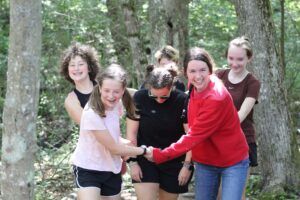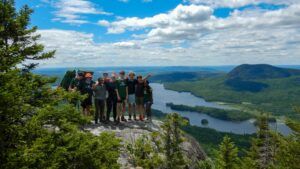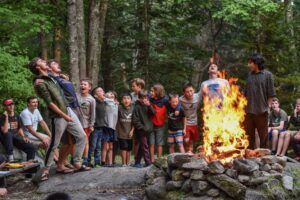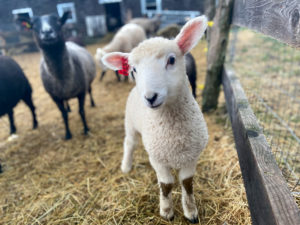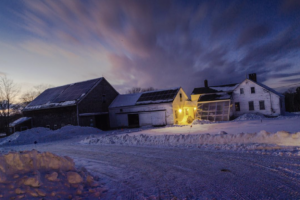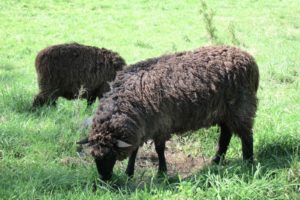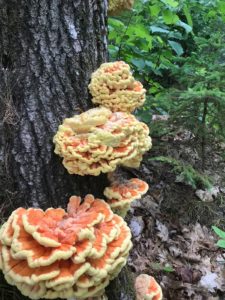Below are excerpts from stories that the farm crew shared with Semester 52 students and families this Family Weekend. We are exceedingly grateful – each of us – to this group of students for depth of their work this spring.
The sheer quantity of work completed by the hands of Semester 52 students and staff is of note. The spring was slow to come, and we lingered in winter for a long while. During this time, students rose to the occasion of lingering in wood season, processing 44 cords of firewood for cabin, staff houses, and a newly expanded wood-heated boiler system that will heat both the dining facility and the main classroom building on campus. To give some perspective, that’s enough wood to fill a quarter of this room from floor to ceiling. Some students took quickly to the task of splitting wood by hand with a maul, and others took a few work programs to get the hang of it. Throughout the semester, it was a joy to hear notes of pride creep into stories of wood splitting: some people improved their splitting rate 100% from their first work program to their second . . . that is, they split one piece of wood over the course of two hours of solid effort during their first work program, and two pieces during their second. By the end of wood season, every student could split in two hours a pile that was something to brag about. Some – including Quinn, Megan, Josie, Tucker, Dale, and others – were especially prolific and tireless. When we gave tips a few weeks into wood processing on how to break fewer maul handles, students stopped breaking handles . . . quite so much. There was a certain stick-to-itive-ness of the winter, and the students mirrored that, like Alannah, who stayed on her knees one work program digging a pile of firewood out of the snow long after everyone else had given up the frozen, battering task.
As spring finally found us, the capacity for good work transitioned out of the woods and onto the farm. Just this week, 24 students tromped down to the farm for their final work program of the semester. In those two hours, we planted all of our potatoes, sweet potatoes, and dry beans for the season, mucked out a winter’s worth of bedding and manure from the barn, and spread woodchips around apple trees in the new orchard. Whew.
Much of the work that we do on work programs is unremarkable work. That is, there is little about it that is flashy: we use no special gadgets or technologies, and few in today’s fast-paced world would stop and stare in awe at the result. We live in a culture that increasingly dismisses the work of the hands, and yet we have reelevated that work here in these months.
The work itself could be called unremarkable – what, really, is two rows of sweet potatoes successfully planted in the grand scheme of things? And a well-stacked shed of wood barely even hints at the sawing, twitching, bucking, splitting, moving, and stacking that went into it . . . and that work could have been accomplished faster and away from this place with fossil fuels. Yet this work – which at face value seems so insignificant in scale – tends to our most basic needs as humans: we are warmed, fed, and buoyed by the end result. There is much to celebrate too in how we go about the work. Hilary remembers a day of up-potting tomatoes with Phoebe, Dolma, Karly, and Lyra; she spoke of having solid conversations about future plans and experiences back home and connections to farming. These conversations are so much evidence of the connection between the head, heart, and hands: we speak to what we believe and love when our hands are busy, and we talk about the plot twists in Harry Potter books while milking or what we wish we’d known as children while wood stacking. I was reflecting yesterday on my first day of teaching chainsawing skills, when both Maria and Veronica took on a power tool with no small dose of aplomb and attention to detail. I remember wanting Veronica to be more nervous than she was so that I would know that she would be extra careful, but she was not nervous. And she was careful. So many times this semester, students just simply stepped up and did what needed doing.
One afternoon Emily and I set out to deliver firewood to Gordy for next year just as work program was drawing to a close. Chatting with Emily is always a pleasure, and we’d meandered through many conversation topics already when Dale passed by, heading back towards his cabin at work program’s end. In typical Dale fashion, he paused to ask if there was anything he could do to help, and, though the work was not required, it did need to get done, so he hopped up on the back of the truck and started throwing wood out onto the ground. The conversation moved to fisheries in Mexico; we tossed and talked, and I was sorry when the truck was empty. Unremarkable? Remarkable.
We would be remiss if we did not mention the sense of ownership of the farming systems that students held this semester. Though few got to see a lamb birth, so many were willing to rise in the middle of the night to do lamb watch at midnight or 3 am. During the middle of one night, I woke to the sound of Phoebe’s voice coming through the walkie talkie. She did not start by saying, “Megan, are you awake?” or “Megan, we need you.” She just simply started barking information at me: “We have a sheep in the barn with something hanging out the back of it. It looks like . . .” I sat bolt upright in bed, replied that I’d be down in a minute, and rushed to get dressed. While pulling on my coveralls, Phoebe’s voice again shouted out, “I have a correction. There is actually a lamb. I repeat, a lamb has been born. There is a lamb on the ground. And the sheep still has something hanging out of the back of her.” Phoebe named the lamb Lady and made an announcement at lunch that day – her birthday and the lamb’s birthday – about “her” lamb, an announcement that could have been interpreted to sound as though she herself had done the hard work of birthing it. Now that’s ownership.
That sense of ownership extends into the realm of teaching others about our farm. Just this morning Rafi taught his sister to milk, and Nick brought his father along on his chores to tend to chickens. In the latter part of the semester, a plethora of students led young people participating in Chewonki’s Outdoor Classroom program through chores to tend to livestock. Claire, Karly, Nina, and so many others stepped into the role of teacher in the barn, not just doing the chores or showing younger students how to do the chores, but talking through the why of what they were doing, highlighting facts and asking and answering questions as they worked.
Students took ownership too over their education through Human Ecology projects, and many of these were focused on food and farming: BJ wrote a book about low-impact forestry, Nick practiced such forestry with tools of old, Karly built a relationship with Sal and translated her experience into a lesson plan for children about the horse/human relationship, and Liza developed a physical therapy routine for Sal to prevent injuries.
Lastly, the final bit of our day as farmers is usually an evening walk through the barn to close in the chickens, shut up the greenhouse and high tunnel, and give an extra flake of hay to the cows. This semester the students took this on in its entirety: each week, two students volunteered (some like Isaac and Wyatt, tried to volunteer every week) to do this final walk through, and we farmers rested easy knowing that the farm lay in good, communal hands.
Students, we hope that you will take time to reflect on all the ways you lit up and were lit up by our few acres of farmland, the ways that you made connections between your head, heart, and hands in this place and with these people. And I hope that you will share stories about these things – about how you have been present, and about how you have elevated work to a place of relevance and significance. Share stories about stinky compost boots and horsepower logging and sheep shearing and wood splitting, and about all the non-farmy things too – the bathroom cleaning, trash collecting, boat work, and mop ‘n cleans. And keep doing good work in the world: use your working capacity, make everyday work remarkable, and take ownership. And come back to us sometime.





